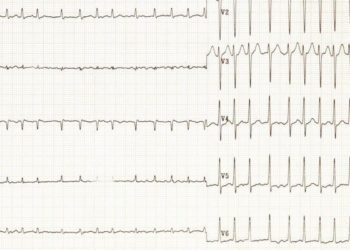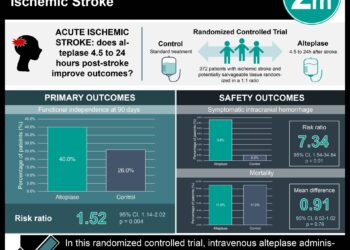Intracranial carotid artery atherosclerosis independently linked to increased stroke risk
Image: PD
1. Intracranial carotid artery atherosclerosis was demonstrated to be a major risk factor for stroke in a white population.
2. Intracranial atherosclerosis was shown to be a major risk factor for stroke independent of cardiovascular risk factors and degree of extracranial carotid artery plaque.
Evidence Rating Level: 2 (Good)
Study Rundown: Ischemic strokes make up the overwhelming majority of all strokes. These can be further classified into subtypes including, large-vessel atherothrombotic origin (such as extracranial internal carotid artery stenosis), embolic (such as atrial fibrillation), and small vessel atherosclerosis of the intracranial vasculature. While the finding of intracranial carotid artery atherosclerosis as a risk factor for stroke is primarily supported by data from African and Asian populations, trials targeting this etiology are mostly comprised of a white population.
In this prospective population-based cohort, researchers found that larger intracranial carotid artery calcification (ICAC) volume, when used as a proxy for intracranial atherosclerosis, was related to a higher risk of stroke, independent of cardiovascular risk factors and ultrasound based carotid plaque score. Strengths of this study include the large sample population recruited and the excellent follow-up data on most of these patients. Readers should be aware that while ICAC has been studied as a proxy for intracranial atherosclerosis, cerebral angiography remains the gold standard to assess degree of stenosis of an intracranial artery. Furthermore, the study shows that ICAC contributed to 75% of all strokes. Readers should take note that this is a population-attributable risk (PAR) and does not mean that all other etiologies make up 25% of strokes. Although ICAC contributes to stroke, the same patients might have other risk factors that contribute to stroke as well.
Click to read the study, published today in JAMA Neurology
Relevant Reading: Race-ethnicity and determinants of intracranial atherosclerotic cerebral infarction. The Northern Manhattan Stroke Study
In-Depth [prospective cohort]: This prospective population-based cohort study based in Rotterdam, Netherlands recruited 2524 participants. After restricting the study group to only self-identified persons of white descent, and eliminating CT examinations with artifact, those with previous stroke, and finally participants who did not follow-up, 2323 participants remained with data for analysis. The mean age of the population was 69.5 years. During a mean follow-up of 6.1 years, 91 participants had a stroke, 74 of which were ischemic.
ICAC volumes were used as a proxy for intracranial carotid artery atherosclerosis. Larger ICAC volumes were associated with higher risk of stroke even after adjusting for cardiovascular risk factors. The hazard ratio (HR) per increase of 1 standard deviation (SD) in ICAC volume was 1.53 [95% CI, 1.14-2.04] for ischemic stroke. When additionally adjusted for ultrasound carotid plaque score and calcification volumes in other vessel beds, larger ICAC volumes remained significantly associated with a higher risk of stroke. HR per increase of 1-SD in ICAC volume was 1.43 [95% CI, 1.04-1.96]. Population-attributable risk (PAR) for stroke due to calcification in each of the 4 vessel beds was also calculated. By this method of calculation, ICAC was found to play a role in up to 75% of all strokes, while aortic arch calcification and calcification in the extracranial carotid artery played a role in 45% and 25% of strokes, respectively.
©2012-2014 2minutemedicine.com. All rights reserved. No works may be reproduced without expressed written consent from 2minutemedicine.com. Disclaimer: We present factual information directly from peer reviewed medical journals. No post should be construed as medical advice and is not intended as such by the authors, editors, staff or by 2minutemedicine.com. PLEASE SEE A HEALTHCARE PROVIDER IN YOUR AREA IF YOU SEEK MEDICAL ADVICE OF ANY SORT.









